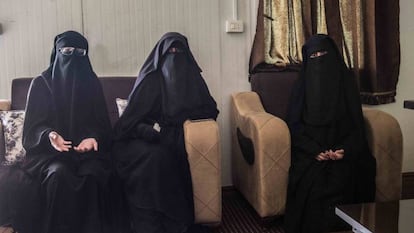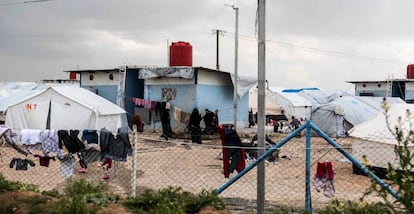The Spanish ISIS women who are caught in a legal limbo
Yolanda Martínez, Luna Fernández and Lubna Miludi were located by EL PAÍS in Syria, but two of them have been moved from camp to camp, and are still awaiting a decision about their repatriation

In the Al-Hol refugee camp in northeast Syria, 72,000 people live in tents surrounded by a wire fence. Most are women and children who once were a part of the self-proclaimed Caliphate in Iraq and Syria, which was brought to its knees by the Kurds last March with the support of an international coalition. A gloomy sea of dark headscarves and niqabs, fights and insults are the order of the day here as tensions run high with little prospect of relief. This is where, in April, EL PAÍS tracked down the only three ISIS women in Syria claiming to be Spanish. Stranded, with 15 minors in their care, they told their story. Two months on, the Spanish jihadist women are no longer in Al Hol. But nor are they in Spain.
The first to arrive at the Al-Hol camp on March 1 was Luna Fernández Grande, who was born in Madrid in 1989. She was five months pregnant and taking care of eight children under the age of 16, four of whom were hers and the other four orphans belonging to the second wife of her husband, a Spanish jihadist who died in Syria.
The next to arrive was Yolanda Martínez Cobos, who was born in Madrid in 1985. She came with four children fathered by a Spanish jihadist, who is currently behind bars in a Kurdish jail.
The idea is to repatriate the women and the children, although the order has not yet been given Spanish government official
The two women were then joined by Lubna Fares, who was born in Morocco in 1979. Despite claiming to have Spanish nationality, she actually holds a Moroccan passport. Her three children, however, are Spanish, having been born to a jihadist father, a nationalized Spaniard who allegedly died in combat.
Spain, like the rest of Europe, is nervous about repatriating extremists who could be released in their country of origin because there is not enough evidence to sentence them. The European Union does not have a common framework to address the issue, and so some member states have opted for repatriating their most vulnerable nationals: orphans who are minors. Last Thursday, a delegation from the Belgian government returned from Syria with five minors in tow, bringing the number of European orphans repatriated since March to 36 – 17 French, seven Swedish, five Norwegian and two Dutch, according to the Kurdish militias. Since the start of the year, more than 200 minors have died in the northeast of Syria from respiratory problems, malnutrition and other diseases.
“The Spanish government has not contacted us to claim back its citizens,” says Abdulkarim Omar, the man in charge of international relations for the Kurdish forces that control the north of Syria.

The family members of the three women who live in Madrid, and the grandmother of the four orphans being cared for by Luna Fernández Grande, say that they have not heard from the authorities. “At the Interior Ministry, we were told that it was all being dealt with by people higher up,” complains one of the relatives, while another source close to the families claims that at least two of the children are sick. “The justice system will decide what to do with the women but their parents want them repatriated so that they can look after their grandchildren, who are not to blame [for being in Syria] and whose lives are in danger there,” the same source says.
Conditions at the Al-Hol camp are challenging. Between the filth and the untreated wounds, the stench is unbearable. There is a constant noise of insults, cries and screams of physical agony from those who still have shrapnel lodged in their bodies after more than five years of war.
On May 22, the repatriation process took an unexpected turn. A number of messages sent to the families in Madrid via WhatsApp made them think that the return of their loved ones to Spain was imminent. The three women said that they had signed a document, agreeing to be voluntarily repatriated to Spain in the space of seven days. It is not known who gave them the paperwork, but by May 24, they were no longer living in Al-Hol. “They have taken them,” a spokesman for the camp told EL PAÍS. “There are no more Spaniards here.”
For the next two days, there was no sign of the women. Then Cobos resurfaced. “They took me out of the [Al-Hol] camp, telling us that they were sending us to Spain and they have put us in another camp,” Cobos told her family via WhatsApp messages, to which EL PAÍS has had access. The two women who hold Spanish passports had been taken with 11 of the minors to the Al-Roj camp, which is also in the north of Syria and has just a thousand people and better conditions in terms of hygiene and safety.
Since the start of the year, more than 200 minors have died in the northeast of Syria
“The idea is to repatriate the women and the children, including the four orphans, for humanitarian reasons, although the order has not yet been given,” a Spanish government official has confirmed to EL PAÍS. “It’s about having a legal case ready so that when they arrive on Spanish soil, they can be handed over to the High Court. Fares has opted to stay in Al-Hol after asking to be repatriated to Morocco,” says the official, adding that the fate of Omar El Harchi, Cobos’s husband and until now the only male Spanish ISIS fighter known to be being held in a Kurdish jail, could be decided within the European framework.
The Spanish ISIS women are still waiting for an answer from the authorities, while being moved from camp to camp, stuck in a limbo that has turned into a time bomb for the Kurds who are holding them, but also a legal conundrum for the jihadists’ countries of origin. There are 800 men and 700 women from Europe, with a total of 1,500 children between them, in the same situation.
A writ from a Madrid courtroom in 2013 already linked these three women to the jihadist Al Andalus Brigade responsible for radicalizing their husbands. However, none of them were charged at that time, though the conversations recorded in the court filings make it clear that they were aware of their husband’s plans to travel to Syria.
The women now maintain that they were tricked by their husbands into going. According to experts, they are resorting to taqqiya, a precautionary dissimulation or denial of religious belief allowed in Islam in the face of persecution. In their case to avoid being accused of belonging to a terrorist group.
Additional reporting by Óscar López-Fonseca, Patricia Ortega Dolz and Guillermo Abril.
An international court to try foreign jihadists
As there is no established protocol in the fight against terrorism, the international community has begun to discuss what to do with their jihadist nationals. Many countries are nervous about repatriating extremists who went to fight in Syria in case there is not enough evidence to sentence them once they are in their country of origin.
The Netherlands has proposed to the United Nations Security Council the creation of an ad hoc international tribunal, which would try members of the ISIS terrorist group. Sweden and Belgium have backed the suggestion, which will be studied in more detail in the fall after being discussed from July 6-8 in the International Forum to take place in the north of Syria.
Until now, only Asian and Arabic countries along with Russia have repatriated their male nationals, while the United States and the United Kingdom have opted to revoke citizenship from extremists provided they have a second nationality to fall back on.
Washington and Paris have started to take their male jihadists from Kurdish jails to prisons in Iraq, a key player when it comes to the fight against ISIS, but where the death sentence is still in force. The Kurdish autonomous region is not recognized by the international community.
Right now, at least one German woman and eight Frenchmen have been condemned to death by the Iraqi justice system, sentences criticized by a number of NGOs, which claim the trials were superficial and that the transfers lacked transparency and proper legal guarantees. Others have been sentenced to life imprisonment and the Iraqi authorities are asking their countries of origin for the €1.8 million for each jihadist sentenced.
“This is great business for the countries belonging to the international coalition [which Spain is part of] and for the Kurds in Syria as well as for Iraq,” says one European military official from Beirut.
English version by Heather Galloway.
Tu suscripción se está usando en otro dispositivo
¿Quieres añadir otro usuario a tu suscripción?
Si continúas leyendo en este dispositivo, no se podrá leer en el otro.
FlechaTu suscripción se está usando en otro dispositivo y solo puedes acceder a EL PAÍS desde un dispositivo a la vez.
Si quieres compartir tu cuenta, cambia tu suscripción a la modalidad Premium, así podrás añadir otro usuario. Cada uno accederá con su propia cuenta de email, lo que os permitirá personalizar vuestra experiencia en EL PAÍS.
¿Tienes una suscripción de empresa? Accede aquí para contratar más cuentas.
En el caso de no saber quién está usando tu cuenta, te recomendamos cambiar tu contraseña aquí.
Si decides continuar compartiendo tu cuenta, este mensaje se mostrará en tu dispositivo y en el de la otra persona que está usando tu cuenta de forma indefinida, afectando a tu experiencia de lectura. Puedes consultar aquí los términos y condiciones de la suscripción digital.









































